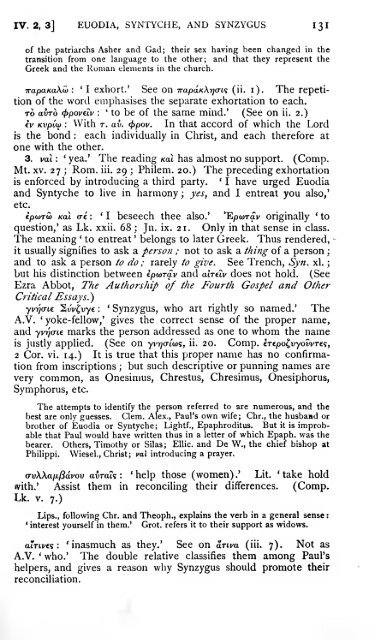Philippians and Philemon - MR Vincent - 1906.pdf
Philippians and Philemon - MR Vincent - 1906.pdf
Philippians and Philemon - MR Vincent - 1906.pdf
Create successful ePaper yourself
Turn your PDF publications into a flip-book with our unique Google optimized e-Paper software.
IV. 2, 3] EUODIA, SYNTYCHE, AND SYNZYGUS I3I<br />
of the patriarchs Asher <strong>and</strong> Gad; their sex having been changed in the<br />
transition from one language to the other; <strong>and</strong> that they represent the<br />
Greek <strong>and</strong> the Roman elements in the church.<br />
'<br />
: I exhort.' See on (ii. i). The repetition<br />
of the word emphasises the separate exhortation to each.<br />
' TO : to be of the same mind.' (See on ii. 2.)<br />
cv : With . . . In that accord of which the Lord<br />
is the bond : each individually in Christ, <strong>and</strong> each therefore at<br />
one with the other.<br />
3. vat :<br />
* yea.' The reading has almost no support. (Comp.<br />
Mt. XV. 27 ; Rom. iii. 29 ; Philem. 20.) The preceding exhortation<br />
is enforced by introducing a third party. * I have urged Euodia<br />
<strong>and</strong> Syntyche to live in harmony; yes, <strong>and</strong> I entreat you also,'<br />
etc.€ *<br />
: I beseech * thee also.' originally to<br />
question,' as Lk. xxii. 68 ; Jn. ix. 21. Only in that sense in class.<br />
The meaning ' to entreat ' belongs to later Greek. Thus rendered,<br />
it usually signifies to ask a person ; not to ask a thing of a person ;<br />
<strong>and</strong> to ask a person to do ; rarely to give. See Trench, Syn. xl. •,<br />
but his distinction between <strong>and</strong> aiVctv does not hold. (See<br />
Ezra Abbot, T/ie Authorship of the Fourth Gospel <strong>and</strong> Other<br />
Critical Essays. )<br />
].^:<br />
A.V. ' yoke-fellow,' gives the correct sense of the proper name,<br />
<strong>and</strong> ]. marks the person addressed as one to whom the name<br />
is justly applied. (See on -, ii. 20. Comp. €€,<br />
2 Cor. vi. 14.) It is true that this proper name has no confirmation<br />
from inscriptions ; but such descriptive or punning names are<br />
very common, as Onesimus, Chrestus, Chresimus, Onesiphorus,<br />
Symphorus, etc.<br />
* Synzygus, who art rightly so named.' The<br />
The attempts to identify the person referred to are numerous, <strong>and</strong> the<br />
best are only guesses. Clem. Alex., Paul's own wife; Chr., the husb<strong>and</strong> or<br />
brother of Euodia or Syntyche; Lightf., Epaphroditus. But it is improbable<br />
that Paul would have written thus in a letter of which Epaph. was the<br />
bearer. Others, Timothy or Silas; EUic. <strong>and</strong> De W., the chief bishop at<br />
Philippi. Wiesel., Christ; val introducing a prayer.<br />
?: 'help those (women).' Lit. 'take hold<br />
with.' Assist them in reconciling their differences. (Comp.<br />
Lk. v. 7.)<br />
Lips., following Chr. <strong>and</strong> Theoph., explains the verb in a general sense :<br />
' interest yourself in them.' Grot, refers it to their support as widows.<br />
amve? : 'inasmuch as they.' See on (iii. 7). Not as<br />
A.V. ' who.' The double relative classifies them among Paul's<br />
helpers, <strong>and</strong> gives a reason why Synzygus should promote their<br />
reconciliation.





